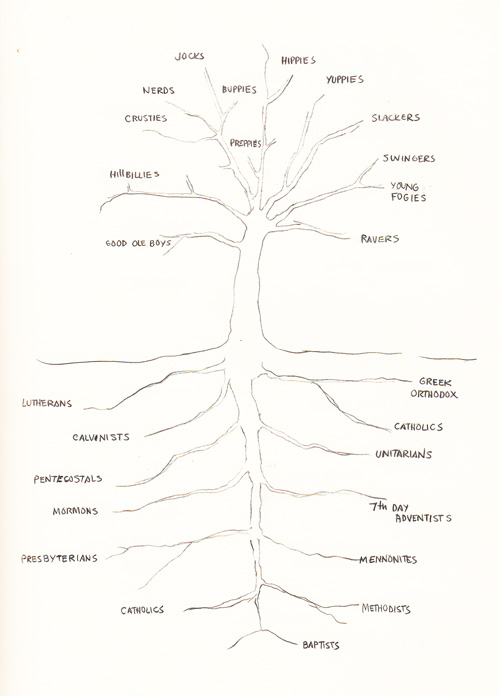
A bit random: last week Brain Pickings highlighted David Byrne’s 2006 collection of pencil diagrams, Arboretum, and suffice it to say, the project is in keeping with the oddball beauty/eclecticism of everything the former Talking Head does. The diagrams in question are as funny as they are unorthodox, but it was the rationale laid out in his introductory essay that made me want to post a few of them here. Certainly the most charming musings on intelligent design I’ve come across in ages:
I happen to believe that a lot of scientific and rational premises are irrational to begin with—that the work of much science and academic inquiry is, deep down, merely the elaborate justification of desire, bias, whim, and glory. I sense that to some extent the rational “thinking” areas of our brains are superrationalization engines. They provide us with means and justifications for our more animal impulses. They allow us to justify them both to ourselves and then, when that has been accomplished, to others. “The hope that a mathematically unique solution will emerge [as an explanation of nature] is as faith-based as intelligent design,” says Leonard Susskind, inventor of string theory.
This might not seem like a very optimistic perspective on intelligence, but even viewed this cynically, the result of centuries of this cerebral activity has produced a lot of beauty, pleasure, and magnificent, well, stuff…
The world keeps opening up, unfolding, and just when we expect it to be closed—to be a sealed sensible box—it shows us something completely surprising. In fact, the result and possibly unacknowledged aim of science may be to know how much it is that we don’t know, rather than what we do think we know. What we think we know we probably aren’t really sure of anyway. At least if we can get a sense of what we don’t know, we won’t be guilty of the hubris of thinking we know any of it. Science’s job is to map our ignorance…
I see recent news photos that (unintentionally?) mimic Caravaggios, others that look exactly like images from Star Wars, the body attitudes of the Loas of Vodou or of classical Greek sculpture. Postures, poses and perspectives keep recurring over and over. As if Jung’s archetypes—characters, relationships and stories imbedded in our thoughts—unconsciously urge us not only to psychologically label situations and relationships, but also to gravitate towards certain images and specific angles in our image choices. The picture editor in our heads. I don’t think every photojournalist, for example, has a childhood memory of classical art that they once saw on a school trip that they use as an unconscious reference, though some might. I think rather the journalists and the classical artists are more likely drawing on the same deep internal sources. Here indeed is intelligent design.
[youtube https://www.youtube.com/watch?v=i5-GJIMPujQ&w=600]

COMMENTS
3 responses to “David Byrne on Superrationalization Engines and the Legacy of Good Habits”
Leave a Reply
















I saw this on Brain Pickings, it is truly excellent. I’m reading a book by Thomas Nagel called “Mind and Cosmos” which lays its finger on this idea from a philosophical perspective. I think a huge portion of the intellectual community is waking up to the fact that random chance plus time really cannot account for the reality we see around us. Nagel’s point is that non-rational chance forces may be imagined to have given birth to the physical and biological reality, but irrational forces cannot easily be imagined to have given birth to rationality. They are by definition alien. He posits a kind of (unwarranted, IMHO) pantheism which isn’t theist. Most creative people fearlessly tromp all over the physicalist neuro-chemical adaptive theories about the genesis and operation of the human intellectual and emotional experience, accepting the “on-the-ground” human reality of things while giving a confused token nod to the materialist explanations currently fashionable with the scientific hegemon. I think the deterministic implications for the physicalist explanations are becoming too much for most thoughtful people. Byrne channels this zeitgeist perfectly with these wonderful little diagrams. Throw explanation out the window and explain your intuition into what is actually there in human experience. It is certainly nice to be a Christian and have such a powerful monad to base our rationality and our intuition on, which match reality so closely.
After rereading this, I realize that I have got to stop reading these kinds of books so much. Good gravy.
We have this if you want to borrow. I bought it when it was published and it’s just wonderful!